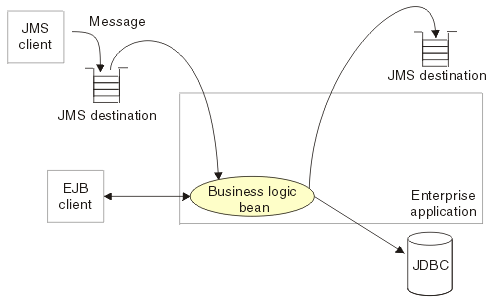JMS interfaces - explicit polling for messages
Applications can use JMS to explicitly poll for messages on a destination, then retrieve messages for processing by business logic beans (enterprise beans), which extract data or to send the message on to another JMS destination.
WAS supports asynchronous messaging based on JMS providers and JCA specifications, which provide a common way for Java programs to create, send, receive, and read asynchronous requests, as messages using JMS destinations (queues or topics).
Applications can use both point-to-point and publish/subscribe messaging.
WAS supports applications that use JMS 1.1 domain-independent interfaces (common interfaces). Applications can create both queues and topics in the same session and coordinate their use in the same transaction.

WebSphere applications can use standard JMS calls to process messages, including any responses or outbound messaging.
Responses can be handled by an enterprise bean acting as a sender bean, or handled in the enterprise bean that receives the incoming messages. Optionally, this process can use two-phase commit within the scope of a transaction. WebSphere applications can also use message-driven beans.
Related concepts
Message-driven beans - automatic message retrievalIntroduction: Messaging resources
Related tasks
Use startup beansUse asynchronous beans